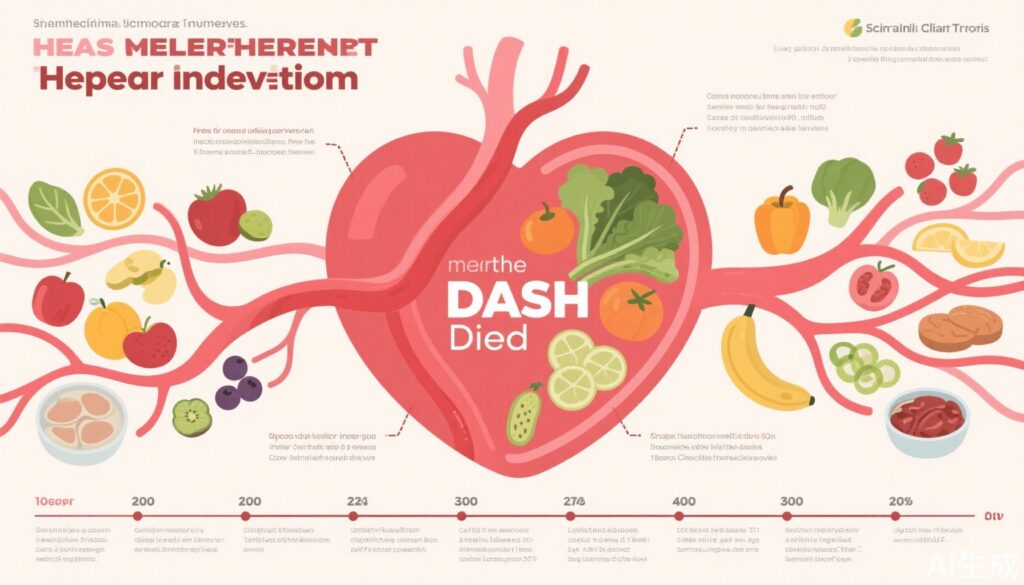Highlights
- The DASH diet effectively lowers blood pressure and improves lipid profiles in adults without diagnosed cardiovascular disease.
- Evidence on its impact on hard cardiovascular outcomes such as myocardial infarction, stroke, and mortality remains limited and inconclusive.
- No randomized controlled trials have tested the DASH diet for secondary prevention or its effect on heart failure and revascularisation procedures.
- Robust long-term trials with larger samples are needed to clarify the DASH diet’s role in cardiovascular event prevention and safety.
Background
Cardiovascular diseases (CVD) remain the leading cause of global morbidity and mortality, underscoring the critical need for effective preventive strategies. The Dietary Approaches to Stop Hypertension (DASH) diet, rich in fruits, vegetables, whole grains, and low-fat dairy while limiting sodium, saturated fat, and cholesterol intake, was originally developed to reduce blood pressure. By increasing key nutrients such as potassium, calcium, magnesium, and fiber, the DASH diet is postulated to improve cardiovascular health beyond blood pressure control. Despite extensive research on its effects on intermediate risk factors, uncertainties persist about its long-term impact on clinical cardiovascular events like myocardial infarction and stroke, particularly in adults with existing cardiovascular disease (secondary prevention).
Key Content
Search and Study Characteristics
A comprehensive Cochrane review published in 2025 by Bensaaud et al. systematically searched randomized controlled trials (RCTs) comparing a DASH diet intervention against no intervention (including usual care), minimal intervention, or other dietary approaches up to May 2024. Inclusion criteria mandated adult participants with or without cardiovascular disease and a minimum intervention duration of eight weeks with at least three months follow-up. Five RCTs met the criteria, encompassing 1397 participants from the USA and Poland. All participants were free from diagnosed cardiovascular disease, emphasizing primary prevention contexts. Intervention lengths ranged from 16 weeks to 12 months with follow-up durations between 16 weeks and 18 months.
Outcomes on Major Cardiovascular Events
No significant differences were observed between DASH diet and comparison groups regarding myocardial infarction, stroke, or mortality. For example, one trial (144 participants) reported zero myocardial infarction and stroke events across intervention and control groups over one year. Another trial with 90 participants observed no deaths over six months. When the DASH diet was compared to minimal intervention, limited events and wide confidence intervals indicated imprecision and insufficient power to detect effects (e.g., RR for myocardial infarction 2.99; 95% CI 0.12–73.04). No reported data existed on heart failure or revascularisation procedures across included studies.
Cardiovascular Risk Factors
Meta-analyses from included trials show that the DASH diet reduces systolic and diastolic blood pressure, lowers total cholesterol and triglycerides, and raises high-density lipoprotein (HDL) cholesterol compared to no intervention or usual care. However, the diet had negligible effects on low-density lipoprotein (LDL) cholesterol. These changes suggest a favorable impact on modifiable cardiovascular risk factors, although evidence quality was low to very low, reflecting methodological limitations including potential biases, small sample sizes, and short follow-up.
Safety and Adverse Effects
The DASH diet was associated with minimal adverse effects. Nevertheless, the absence of long-term safety data limits definitive conclusions regarding its tolerability, especially in patients with existing cardiovascular conditions.
Evidence Gaps and Limitations
All identified RCTs focused on primary prevention; no data are available for secondary prevention populations. Important clinical outcomes such as heart failure incidence and the need for coronary, carotid, or peripheral revascularisation remain unexamined in RCT format. The relatively short duration and sample sizes limit the capacity to observe hard outcomes and rare adverse events. Performance and selection biases, as well as imprecision, further reduce the certainty of evidence.
Expert Commentary
The DASH diet’s consistent efficacy in lowering blood pressure and improving lipid profiles makes it a cornerstone recommendation in hypertension and cardiovascular risk management guidelines worldwide. Its mechanistic benefits stem from increased intake of vasodilatory minerals (potassium, magnesium), improved endothelial function, and anti-inflammatory effects. However, the translation of these intermediate benefits into reductions in myocardial infarction, stroke, and mortality remains inadequately demonstrated. This systematic review highlights a critical research void, particularly regarding long-term cardiovascular event prevention and secondary prevention efficacy.
Clinicians should continue to recommend the DASH diet based on current evidence supporting cardiovascular risk factor amelioration. Yet, they should also remain cognizant of current evidence limitations and the need for individualized patient care plans, especially in those with established CVD.
Conclusion
Current evidence from randomized controlled trials supports the DASH diet’s role in improving key cardiovascular risk factors such as blood pressure and lipid profiles among adults without diagnosed cardiovascular disease. Nonetheless, robust data are lacking on its capacity to reduce major cardiovascular events including myocardial infarction, stroke, heart failure, and mortality, and its application in secondary prevention remains unstudied. Future research should prioritize large-scale, well-designed, and long-duration RCTs incorporating diverse populations to definitively characterize the DASH diet’s impact on cardiovascular morbidity, mortality, and safety.
References
- Bensaaud A, Seery S, Gibson I, Jones J, Flaherty G, McEvoy JW, Jordan F, Tawfick W, Sultan SA. Dietary Approaches to Stop Hypertension (DASH) for the primary and secondary prevention of cardiovascular diseases. Cochrane Database Syst Rev. 2025 May 6;5(5):CD013729. doi: 10.1002/14651858.CD013729.pub2. PMID: 40326569; PMCID: PMC12053460.
- Sacks FM, Svetkey LP, Vollmer WM, et al. Effects on blood pressure of reduced dietary sodium and the Dietary Approaches to Stop Hypertension (DASH) diet. N Engl J Med. 2001;344(1):3-10. PMID: 11136953.
- Appel LJ, Moore TJ, Obarzanek E, et al. A clinical trial of the effects of dietary patterns on blood pressure. DASH Collaborative Research Group. N Engl J Med. 1997;336(16):1117-24. PMID: 9099655.



